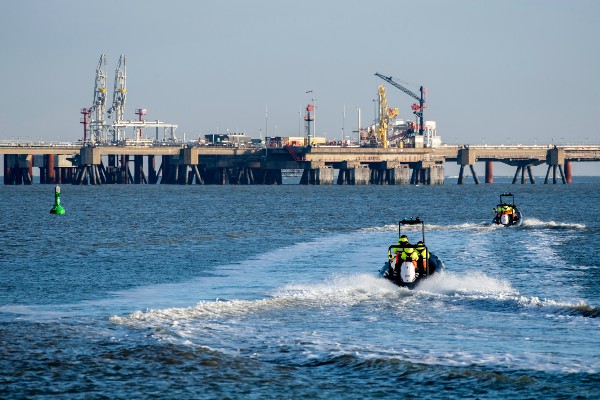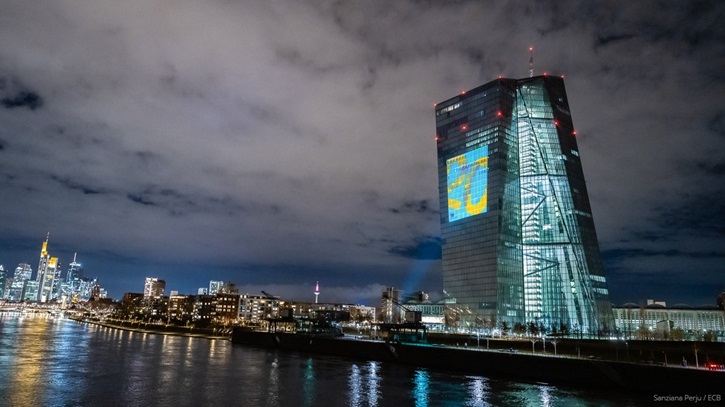
Europe was off to a flying start into managing its energy crisis: demand for gas had fallen by 24% in November compared to the average of the last five years. Then came the Arctic blast, and after just weeks of cold weather, aggregate storage in the EU dropped from 96% to 88%. That's not yet alarming, but shows that the region's situation is subject to unpredictable factors.
Here's what to expect in the coming year, as the region emerges from one winter and prepares for another that could be even harsher.
Gas-in-storage has held up thanks to frantic purchases and a reduction in demand achieved without drastic intervention in consumers' behavior. "There was no real rationing, what we experienced was a fall in demand due mainly to excessively high costs and a recession warning," explains Davide Tabarelli, president and co-founder of NE Nomisma Energia, a private energy think tank. "Basically, it was a saving. Rationing is exactly what might happen to us in the coming weeks, perhaps on some days, in case we don't make it because we don’t have enough gas during the day."
Nearly-full storage tanks don't guarantee warm households for the coming months. Storage is for peak supply, not for everyday use, and Europe's maximum storage capacity covers less than half of its winter consumption. The ability to effectively use those reserves demands a minimum pipeline pressure.
Meanwhile, gas prices have rebounded from €93 to €136 per megawatt-hour over the last month, TTF data shows. "Most likely prices have been pushed by the cold weather, which is supposed to stay a while, but not exclusively," energy and geopolitical expert Dr. Thomas Wilfred O’Donnell told Morningstar. "If we check the data, we see that overall wind and solar have been really down on the baseline, meaning that what has been burned to produce electricity were mainly natural gas and coal."
Why 2023 Will be Different
Europe's success in reducing its reliance on Russian gas supplies in 2022 and in filling gas storage ahead of this winter has been impressive, but to repeat this feat next year will be more difficult: "The current stockpiles are practically all Russian gas, which will not be there next year,", warns Tabarelli. "In this situation, it will be very difficult to arrive with full stocks in October 2023, and this is a serious problem."
"There are two fundamental aspects," says O’Donnell. "The first is Europe's capacity to import – on this front, the creation of new LNG terminals to go online as quick as possible will be crucial. At the moment, the existing projects certainly cannot be enough, considering the size of Nord Stream 1. Europe's ability to import will not change significantly this winter or the following one."
"The other is what's available out there in the world market, where the gas comes from. From this point of view, there are few projects in place at the international level, so it will have to be higher prices in Europe to attract flows away from Asia."
When winter ends in Europe the need to refill gas reserves could result in a rise in seasonal demand for natural gas driving up prices before the summer, especially if China reopens its economy in the first half of 2023 and gas production is not increased substantially elsewhere. Recessions on both sides of the Atlantic could become a mitigating factor in reducing energy demand, though not by enough to bring prices back to pre-war levels.
This mix makes for high price volatility and uncertainty for the gas market in 2023.
O'Donnell doesn't mince his words on what to expect: "In all likelihood, next year will be worse than this year."
"For now, however, we have to think about getting through next January and February, and with the cold weather it will be anything but a walk in the park", concludes Tabarelli.
No Game Changers Until 2026
"Frankly, I don’t see any real change in the dynamics of the market until 2026-2027, where at least three big projects will go online in the US and Qatar’s North Field expansion project will be working at full capacity, at which point all Russian gas could really be replaced," O’Donnell says. He sees Europe experiencing "a real energy war".
The Kremlin is engaged on two fronts, waging two wars: one on the ground in Ukraine and another one at the energy level in Western Europe. "This is the field where Putin can really hurt Europe and he knows that, of course," O'Donnell says. "On the other hand, on the European side no one is seriously thinking about revising the sanctions, so I don't see any possible step backwards for the time being."
"In the short term Russia has huge leverage. Long-term there is plenty of gas in the world, in the US, Qatar, Australia, as well as in Latin America and Africa. We have the technology, it can be done, what the West has to mentally decide that this is what we want and commit for the long-term, even if at the same time we develop renewables.'"
If Europe does its homework, then, "in the long run, Russia can be irrelevant".




























